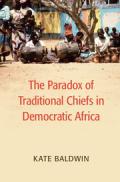
The Paradox of Traditional Chiefs in Democratic Africa shows that unelected traditional leaders can facilitate democratic responsiveness. Ironically, chiefs’ undemocratic character gives them a capacity to organize responses to rural problems that elected politicians and state institutions lack. Specifically, chiefs’ longer time horizons encourage investment in local institutions that enable the provision of local public goods. This is the paradox of traditional chiefs in democratic Africa: elected politicians can only effectively respond to rural constituents through institutions constructed and maintained by local leaders who are not worried about electoral terms. Furthermore, the critical role played by chiefs in brokering local development projects forces us to reassess how we understand the basis of their political influence during elections. The book examines the effects of traditional leaders on the electoral connection in Africa through a multi-method approach that combines qualitative research, surveys, and experiments, with particular attention to the Zambian case.
- Provides a nuanced view of the role played by traditional leaders in contemporary Africa based on systematic evidence
- Readers will learn that decision-making by voters in developing democracies share important similarities in decision-making in developed democracies through an account of the process by which voters decide how to vote in rural Africa
- Combines a wide variety of qualitative and quantitative evidence, with the latter presented in easily comprehensible graphs.
This publication is available on the following link(s):